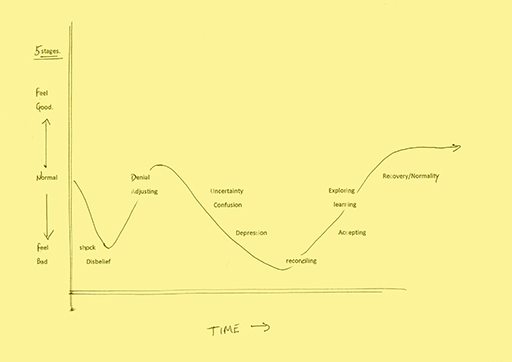1.1 Transition and change
All of us are likely to go through a period of transition as we come to terms with this’ new normal’. For David, whose OU honours degree was in Psychology, transition and change theories (Kübler-Ross, 1969 and Hopson and Adams, 1975) proved useful as a way of thinking about the different stages he went through during his confinement. Transition theory offers a psychological framework for understanding human response to bereavement, grief and other profound life changes.

David used transition theory and the different phases in this diagram, to make sense of his own experiences in the following way:
- Shock /disbelief: My arrest and imprisonment were sudden and unexpected. I experienced trauma and shock as I realised I was being held in a very volatile and severe environment.
- Denial/initial adjusting: After a short period, I entered a ‘honeymoon’ period or one of denial. I got used to the new routines and adapted quickly to what was needed. However, as time went on and there was no foreseeable end to this stage of life.
- Uncertainty/Depression: I entered a downward spiral as I came to realise, I was here for a long time. I felt like there was no preparing for tomorrow. No planning ahead. I had to just take each day as it came.
- Reconciling: At some point there is a bottoming out or turning point where you ‘let go of the old’. For me, this was my trial, where I was found guilty. While unhappy, I could now settle into a new way of life. New routines of my making included undertaking an Open University degree and A levels, art and craft work and physical training.
- Recovery: After a short while I realised, I was making positive inroads into my life situation; regaining confidence and control, learning new ways and a ‘new normal’.
Activity 3 Reflecting on your journey
- Looking at the adapted ‘Transition phases’ graph (Figure 4), where do you see yourself at the moment in this process?
- How might you move yourself to the next stage?
- Thinking about your inner resources, how can you use these current skills or some of the tips and guidance in this course, to help with this process?
